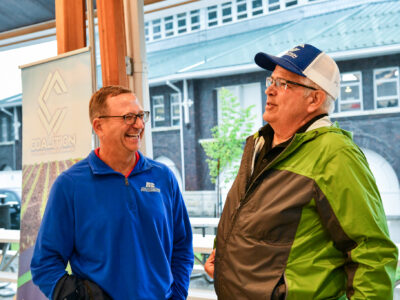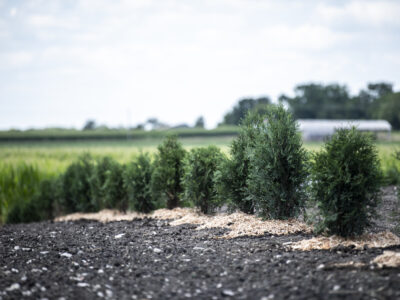Twenty Years of Meeting Farmers’ Needs
08-06-2024 in Anniversary
In 2004, the Coalition to Support Iowa’s Farmers was formed to help Iowa’s livestock farmers implement best management practices, properly site locations for new livestock barns and feedlots, interpret growing rules and regulations, and enhance neighbor relations.
Family farms, eager to bring a son or daughter back into the farming operation, often added a modern livestock barn as part of the family transition and to help capture efficiencies. The additional barn added value to a farm’s row crop operation by providing manure as a valuable fertilizer source. That often created farm/neighbor friction and led to a strong resistance in rural Iowa.
“There was a real lack of optimism, and a significant lack of understanding by the public about modern livestock production,” says Kirk Leeds, CEO of the Iowa Soybean Association and CSIF Board of Directors member.
CSIF began to work with farmers on interpreting regulations and facility siting, going beyond the rule book to take into account wind, topography, nearby water sources and neighbors. From the beginning, CSIF made neighbor relations a priority.
The plan was effective. Livestock facilities were better sited. Neighbor relations improved. Farmers were able to grow their livestock farms with confidence they were complying with regulations and meeting community standards for environmental concerns.
Today, the Coalition continues its work with farmers on neighbor relations and public perceptions, individually and through programs like the Wergin Good Farm Neighbor Award, but also devotes significant time and resources to growing Iowa’s livestock farms, often with the goal of young people returning to the farm.
“We get a lot of calls from farmers who want to grow and diversify, and they want to do it in accordance with the rules and regulations,” says Kody Havens, CSIF Field Specialist. “They want to grow responsibly.”
Havens says many of the inquiries involve calving under roof and raising and feeding cattle in confinement. “The number of calls can depend on the type of spring we’ve had, ”he says, as farmers look for more ways to keep their animals more comfortable.
On the flip side, some feeders are finding building costs prohibitive and are exploring open feedlot expansion. They want to know the best way to do that and keep the state’s water supply clean. CSIF offers an open feedlot check-up that helps them grow responsibly and prepare for on-site DNR inspections.
Havens also gets calls about the growing trend of retained ownership of dairy-beef cross calves. “Given beef prices today, dairy producers are finding it more attractive to retain ownership of calves,” says Havens. “We can help them plan for the future, building a calf barn that doesn’t interfere with their free-stall facilities and doesn’t hamper the growth of their dairy and milk production.”
Helping in Time of Need
Devastation caused by Mother Nature is at the top of Iowans’ minds this summer, and CSIF has answered the call to help rebuild.
In 2020, Steve Schnormeier of Hardin County took shelter from a Derecho in his basement as he watched the trees on his farm fly by.
Some of the grove landed onhis house, some on his hoop barn. He turned to CSIF for help.
They were able to help him “dot the I’s and cross the T’s” on rebuilding his cattle barn, and just as important to Schnormeier, replant trees through the Green Farmstead Partner Program (GFP), a joint effort of CSIF, the Iowa Nursery Landscape Association and Trees Forever implemented in 2009.
“I missed the shade. I missed the wind and snow protection,” says Schnormeier. “You can’t have enough trees.”
By working with a GFP approved nursery trained in livestock facility needs, he was able to add a windbreak to his farm that will provide protection, odor control and aesthetic value to his farm for years to come.
“Storm damage creates opportunities for some farmers,” says Havens. In recent years, CSIF has helped numerous farmers recover from disaster by restoring windbreaks, upgrading damaged facilities and re-siting after total loss.
Other farmers have used the popular GFP program to add windbreaks to new and existing construction.
The Work Continues
Since 2004, CSIF has directly assisted 5,300 Iowa farm families, as well as provided educational programs on aquaculture, farm safety and security, best management practices and beginning farmer issues.
It remains an objective one-stop shop for farmers looking to “do things right.”
“The Coalition has been incredibly successful because it has stayed focused on farmers’ needs,” says Leeds, “and because of the incredible and dedicated staff.”
“They’re here to reach out a hand to help, and we need some help out here in the country,” says Schnormeier. He’s looking forward to working with CSIF on siting a new hog barn in the near future. “They help eliminate hassles, and give good reasons why things should be done a certain way. Their goal is to help.”
“The rules and regulations aren’t getting easier, and available sites are fewer and fewer. There’s more public pressure than ever for livestock farmers to ‘do it right’,” adds Havens. “Our goal is still the same – to help farmers grow successfully and responsibly for their families and the industry. We’re here to help farmers make well-informed decisions.”
And that comes back to a central pillar of the Coalition’s initial mission – enhancing neighbor relations.
“One of the things about CSIF that hasn’t changed, and won’t change, is its emphasis on neighbor relations,” says Havens. “It’s crucial that neighbors get factual information, and that they get it from the farmer involved. That is and always has been a key piece of the CSIF mission.”
Iowa Secretary of Agriculture Mike Naig notes if Iowa’s livestock industry is to continue to thrive and grow, it must be beneficial to all Iowans, saying: “Over the past two decades, CSIF has helped thousands of Iowa families and will certainly continue to be an integral part of keeping our livestock industry and the communities that surround them strong in the years ahead.”
“We want our livestock farmers to be good neighbors today and tomorrow, just like we did when we started 20years ago” adds CSIF Executive Director Brian Waddingham. “They want to farm with minimal environmental impact. They want to protect the land and water for future generations, and for those around them. They want to do it right. And we’re here to help with that.”
The Coalition to Support Iowa’s Farmers was created by farmers to help farmers raise livestock successfully and responsibly. It’s a joint partnership involving the Iowa Beef Industry Council, Iowa Cattlemen’s Association, Iowa Corn Growers Association, Iowa Egg Council, Iowa Farm Bureau Federation, Iowa Pork Producers Association, Iowa Soybean Association, Iowa Turkey Federation and Midwest Dairy. The non-profit, non-partisan organization provides assistance to farmers at no cost. CSIF does not lobby or develop policy. Farm families wanting a helping hand can contact the Coalition at 1-800-932-2436 or www.supportfarmers.com.
Recommended News

State Fair Celebration Honors 20 Years of CSIF
In the 20 years since the Coalition to Support Iowa’s Farmers (CSIF) was formed to help farmers grow responsibly and successfully, CSIF has become the go-to resource for questions about...
Read More
Committed to Doing Things Right
Mike Lambert heard about the Coalition to Support Iowa’s Farmers (CSIF) while listening to the radio one day. He was a young farmer looking at possible avenues for growth. He...
Read More
Growing the Ag Environment
Ryan and Lana Reed of Wapello County spent an almost-spring-like March day tending to the windbreak near two of their hog barns. Planted in 2010, the fast-growing austree hybrid willow...
Read More